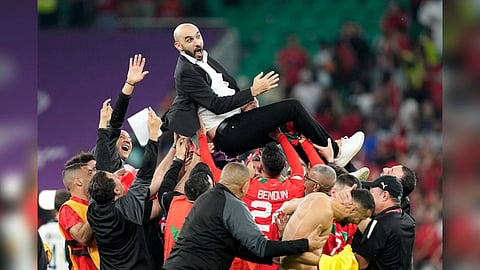Diplomatic Sportsmanship: Morocco Takes The Lead
Rabat, January 24 (TNA) Beyond its brilliant performance in the recent World Cup in Qatar, Morocco has also emerged as a significant player within the institutions governing global football. The kingdom is set to host the 2025 Africa Cup of Nations and co-host the 2030 World Cup, marking two diplomatic successes.
Yassine El Yattioui, a doctoral candidate in political science at the University of Salamanca and Secretary-General of the Nej Morocco think tank. Abderrahim Bourkia is a teaching researcher at Hassan 1st University and a professor of sports sociology at the Institute of Sports Sciences in Settat. Amina Azmi is a teaching researcher at the Prospective Research Laboratory in Finance and Management at Hassan II University in Casablanca.
On December 6, 2022, on the outskirts of Doha, Moroccan goalkeeper Yassine Bono stopped a Spanish penalty kick in a stadium fully supportive of his team. Subsequently, his teammate Achraf Hakimi converted his penalty, securing a spot for Morocco in the quarterfinals of the World Cup. Beyond the Moroccan commentator losing his voice, the cheers of thousands of supporters echoed worldwide, not only in Rabat, Casablanca, or Marrakech but also in Brussels, Paris, Amman, and Accra.
This Moroccan team represents not only the citizens of the kingdom but also the diaspora and, by extension, the Arab-Muslim world and Africa. Their successes on the field are accompanied by other victories, less publicized but equally political, achieved behind the scenes by Morocco in the African and global football institutions.
The kingdom was recently designated as the host for the 2025 Africa Cup of Nations and the co-host for the 2030 World Cup, with support from African federations, including the influential figure in Moroccan football, Fouzi Lakjaâ.

